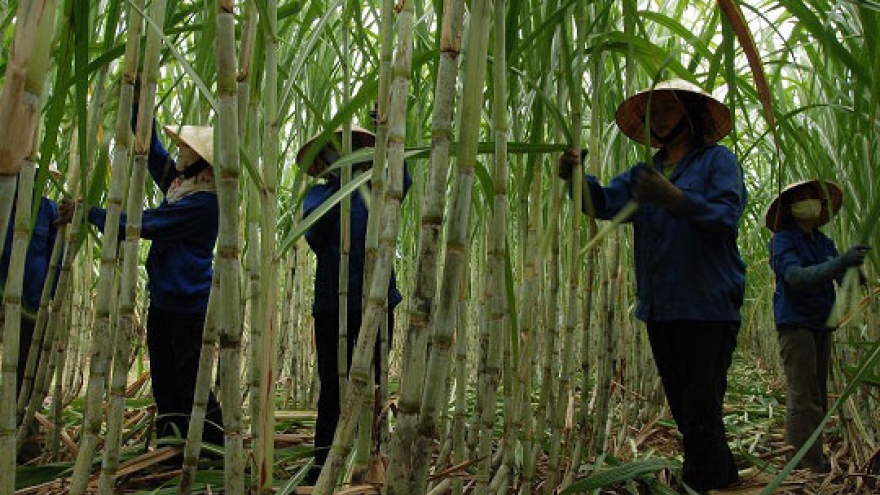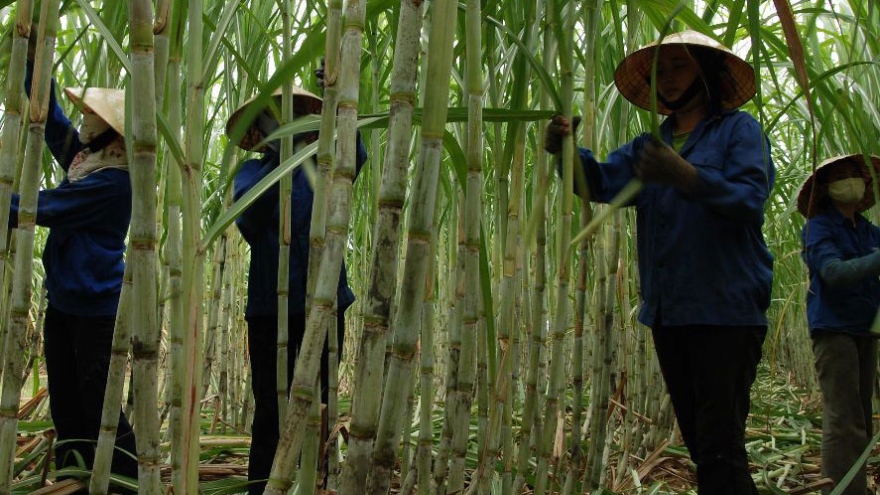2,300ha of sugarcane damaged by salinization in Mekong Delta
Prolonged salinization in the Mekong Delta region has heavily damaged sugarcane plantation areas in several provinces of southern Vietnam, local authorities have said.
According to Ho Thanh Kiet, head of the Bureau of Agriculture and Rural Development of Cu Lao Dung District in Soc Trang Province, over 2,300ha of sugarcane plantation has sustained damage, accounting for over 30% of the total crop.
Of those, he said, over 214ha have been completely destroyed (more than 70%) and 619ha severely damaged (from 50% to 70%).
Kiet attributed the widespread loss to salinization, which has either killed or reduced the productivity of sugarcane plantations, adding that this was the first time salinity had infiltrated this far infield at such a high level of concentration.
 |
“We have filed for financial assistance from the provincial People’s Committee, which will provide VND4 million (US$180) per hectare of completely damaged sugarcanes and VND2 million US$90) per hectare for the rest,” Kiet said.
“We advise people to harvest their crops early to avoid losing sugarcanes and their reserves, as well as not sowing a new harvest until the beginning of the rainy season,” Kiet added.
According to Kiet, there were 6,630ha of sugarcanes grown in Cu Lao Dung in the 2015-16 crop year, of which nearly 3,200ha have already been harvested but at a reduced level of productivity, smaller yield and lower price.
Tuoi Tre (Youth) newspaper journalists have reported seeing fields of sugarcanes running along Cu Lao Dung turning yellow, a sure sign of water deprivation, along with some that have died out completely.
Pham Cong Tho, a resident in An Thanh 2 Ward in Cu Lao Dung, said he had harvested just 7,000m2 of sugarcanes and sold them for VND49 million (US$2,190), which translated to a VND3 million (US$135) loss per thousand square meters, not to mention the labor that his family has spent on growing the crop.
“Had it not been for prolonged salinization and drought, I would have sown a new crop already,” he said.
Several other sugarcane-growing households in the ward have also reported that their harvests have been rejected or bought at a low price by merchants due to their crops’ low sugar levels.
Similarly, sugarcanes grown in Phung Hiep Ward, the largest sugarcane plantation area of Hau Giang Province in the Mekong Delta region at over 7,560ha, have also died of salinization or showed signs of rust due to a lack of water.
Nguyen The Tu, deputy head of Phung Hiep Ward’s Division of Agriculture and Rural Development, said around 200 to 300ha of sugarcanes in the area have been infected with rust disease because people were reluctant to water the plants fearing the water was too heavily salinized.
“The hotter it gets, the faster this disease spreads, so farmers should spray their crops with special repellants and keep the plants hydrated,” Tu advised.
Meanwhile, 400ha of sugarcanes in Thoi Binh District in the southernmost province of Ca Mau are also in danger of being destroyed by the persistent drought.
“Up until now, around 30% of sugarcane fields in the area have either died or stopped growing due to dehydration. If the drought persists, the remaining sugarcanes are also at risk of being lost completely,” said Nguyen Hoang Lam, head of Thoi Binh District’s Bureau of Agriculture and Rural Development.



